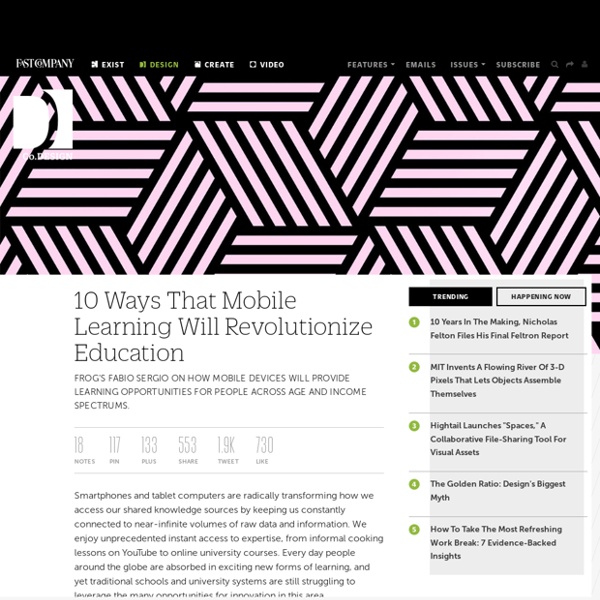10 Ways That Mobile Learning Will Revolutionize Education

http://www.fastcodesign.com/1669896/10-ways-that-mobile-learning-will-revolutionize-education
Mobile Learning
Pathway to a SMILE August 3, 2015 Key Takeaways This case study explains how SMILE — Synchronous Mobile Interactive Learning Environment — allows the instructor to present and record lessons anywhere, anyti… The Evolution Continues: Considerations for the Future of Research in Online and Blended Learning June 16, 2015
Researchers develop ‘smart’ touch-responsive internet-enabled newspaper
My European speaking tour (ending today) has had two primary themes: crowdsourcing and the future of corporate IT. However at a couple of points, notably a guest lecture to Moscow’s Higher School of Economics’ School of Journalism, I have delved into the future of media. As always, my well-known Newspaper Extinction Timeline has come up as a hot topic of discussion. One of things I always have to point out is that we should not be comparing newspapers with the tablets of today when we think about the choices people will make in how they access news.
Mobile Learning Publications
UNESCO Mobile Learning Publications Today there are over six billion mobile phone subscriptions worldwide, and for every one person who accesses the internet from a computer two do so from a mobile device. Given the ubiquity and rapidly expanding functionality of mobile technologies, UNESCO is enthusiastic about their potential to improve and facilitate learning, particularly in communities where educational opportunities are scarce. This Working Paper Series scans the globe to illuminate the ways in which mobile technologies can be used to support the United Nations Education for All Goals; respond to the challenges of particular educational contexts; supplement and enrich formal schooling; and make learning more accessible, equitable, personalized and flexible for students everywhere. UNESCO Policy Guidelines for Mobile Learning
How Tablets Will Change Higher Ed
Tablets are set to change computing with intuitive operating systems, web browsing, access to hundreds of thousands of apps, and even the option to attach a keyboard. From the start, we knew tablets would be big—they’re more mobile than laptops but easier to interact with than phones. It hardly needs to be said (but we’ll say it anyway) that Localist performs well on tablets of all makes, but let’s not kid ourselves: when we say “tablets,” we mean the iPad. Apple’s tablet represents 89% of the US tablet market! Tablets are being adopted at an impressive rate, and tablet purchases are expected to outpace smartphone purchases over the next two years. Tablet ownership among college students has correspondingly skyrocketed and a Pearson Foundation survey found that it has tripled from a year ago.
Emerging trends in education and mobile learning
At the UNESCO Mobile Learning Week 2014 I sat on a panel titled Emerging Trends and New Technology – considered in the context of mobile learning. Below are the notes of the key points that I made. Note: The issue of Emerging Trends and New Technology begs the question: for who? For students in California, or for those in Kolkata? Developed country trends are very different from developing country trends.
Mobile Apps Will Pass - History Will Repeat Itself
Over the past few years the big sexy conversation at conferences has slowly morphed from social media to mobile. It is partially because social media is better understood now but it’s also because mobile is the shiny new toy that everyone is trying to figure out. We have seen incredible inroads that mobile traffic is making up a larger and larger portion of web traffic. Mobile traffic to websites has doubled across the year alone in 2011.With all these discussions it has me thinking more and more of the future of mobile apps. With recent data suggesting that the average user has well over 50 apps installed on their smartphone it is a great time to be an app developer.
Professor Mike Sharples - People Profiles - Open University
Profile For further information see My research concerns human-centred design of new technologies for learning.
The Failure of One Laptop Per Child
"25 million laptops later," Mashable announced today, "One Laptop Per Child doesn't increase test scores." "Error Message," reads the headline from The Economist: "A disappointing return from an investment in computing." The tenor of these stories feels like a grand "Gotcha!"
Related:
Related:



